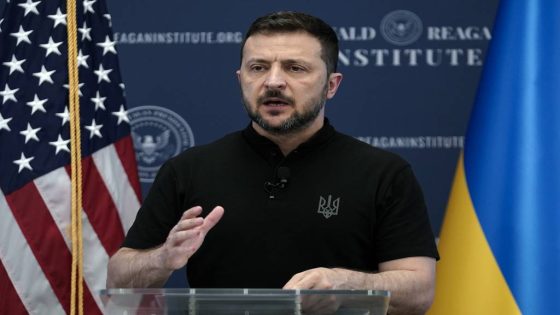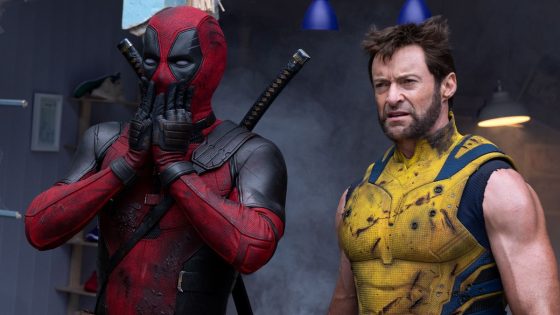Itâs been a busy two months of travel for Lithuaniaâs defense minister.
In June, Laurynas KasÄiÅ«nas traveled to Singapore for the Shangri-La Dialogue, Asiaâs largest defense conference â and one, since Russiaâs full-scale invasion of Ukraine, thatâs seen far more Europeans in attendance.
And this month he was in Washington for the NATO Summit. This time, he didnât have to go do the Indo-Pacific. It came to him.
For the third straight year, a group of countries with ties to the alliance, called the Indo-Pacific Four, have sent officials to attend the summit in person. Members of NATO say this is a sign that the two regions increasingly see their security as shared.
âItâs interlinked,â KasÄiÅ«nas said in an interview.
That point was obvious in the Washington summitâs communique â a plan for the alliance over the next year. Alongside critiques of North Korea, it featured the harshest-ever criticism of China, urging an end to support for Russiaâs defense industry.
âThe [Peopleâs Republic of China] continues to pose systemic challenges to Euro-Atlantic security,â the document reads.
And yet, itâs still hard to see how those interests become action.
The Washington Declaration includes a list of âflagship projectsâ on cyber, disinformation, technology and Ukraine-related issues for the two regions. Members of the alliance point to these as signs of real commitment.
âItâs not just about political messaging,â a senior NATO official told reporters before the summit. âItâs about practical cooperation.â
Others in the alliance, though, are more ambivalent about the new partnerships, or skeptical that they amount to much yet. And the side projects, while beneficial, only matter on the margins compared to what America and Indo-Pacific partners may really want from Europe, said Max Bergmann, an analyst at the Center for Strategic and International Studies.
âThe biggest thing Europe can do for the Indo-Pacific right now is take more responsibility for Europe,â he said.
âEast Asia tomorrowâ
Only weeks before the NATO summit, Bergmann published a report on Europeâs role in Indo-Pacific security.
It tracked a rise in European countries sending their forces to the region, even temporarily. Beside the longtime players of Britain and France, countries such as Germany, Italy and the Netherlands have sent military vessels around Asia. Other European states are joining large military exercises hosted in the region as well.
Driving this increase is mainly Russiaâs full-scale invasion of Ukraine two years ago. Countries in Europe have seen how key China has been to Russiaâs war effort, sustaining Moscowâs defense industry through a huge rise in trade. And countries in the Indo-Pacific started to take the threat China may pose to Taiwan or the Philippines more seriously.
âUkraine today may be East Asia tomorrow,â Japanese Prime Minister Kishida Fumio earlier this year. European officials have since echoed his quote.
At the summit, officials from the four Indo-Pacific countries â Australia, New Zealand, South Korea and Japan â met with Ukrainian President Volodymyr Zelenskyy. And Australia pledged its largest-ever package of military aid to Kyiv shortly after: $250 million of air defense interceptors, munitions and other supplies.
âWeâre breaking down the traditional silos that have been around defense alliances,â said Matt Thistlethwaite, Canberraâs assistant minister of defense, in an interview.
He mentioned military exercises as an example. The week of the NATO summit, 20 nations participated in Pitch Black, a military drill in Australiaâs Northern Territory. The list included NATO nations as well, including Italy and Spain joining for the first time.
Thistlethwaite said there was even a revived push this year to open a NATO office in Japan. The plans were never ambitious â only a few junior officers to be stationed in Tokyo to avoid long flights between there and Brussels. But they collapsed last year after some in the alliance, in particular France, said the new office would provoke China. Bejing chafes at any sign that countries are forming an alliance against it and regularly accuses the U.S. of building an Asian version of NATO.
Despite the new talks, opposition to the office within the alliance hadnât ended. Speaking before the summit, a European official told reporters that his country didnât support the office and didnât feel pressured to anymore.
âThis issue was not discussed at all for the Washington Summit,â the official said.
Theaters
The same official made the traditional counterarguments for NATO becoming involved so far from its borders: it lacks the expertise and the capacity to do so, and the risks may outweigh the benefits.
European countries have been trying to surge their defense industries since Russiaâs full-scale invasion. But more than two years later, the results have been slow.
The incremental progress means that America is still somewhat tied down in Europe. Most in Washington say itâs in Americaâs interest to support Ukraineâs self-defense, and the administration has spent more than $51 billion on security aid for Kyiv since 2022.
But the last two presidents have said their top challenge is China. And while the weapons going to Ukraine mostly wouldnât matter for Taiwan or the Philippines, some of Americaâs forces are in a zero-sum game.
âThe United States should clarify to NATO allies the impact an Indo-Pacific contingency would have on the European theater,â reads Bergmannâs report.
And if European countries are to become more involved in Asian security, they should weigh carefully whether they do so under the label of NATO, multiple analysts and officials told Defense News. Because the alliance is so reflexively threatening to China, the earlier European official said, using it could be âcounterproductiveâ toward maintaining peace.
Still, the official supports lower-level cooperation like that seen in the Washington Summitâs final plan. This kind of work is what the two regions will likely focus on in the near future, said Bonnie Glaser, an expert at the German Marshall Fund: countering terrorism and disinformation, protecting against climate change and work on cybersecurity.
Even getting the two regions to see each other as security partners has been a win for this White House, she argued.
âWhen [U.S. President Joe] Biden came to power, Europeâs attention to possible war in the Taiwan Strait was negligible at best,â said Glaser.
Noah Robertson is the Pentagon reporter at Defense News. He previously covered national security for the Christian Science Monitor. He holds a bachelorâs degree in English and government from the College of William & Mary in his hometown of Williamsburg, Virginia.
Bryant Harris is the Congress reporter for Defense News. He has covered U.S. foreign policy, national security, international affairs and politics in Washington since 2014. He has also written for Foreign Policy, Al-Monitor, Al Jazeera English and IPS News.
Source Agencies



